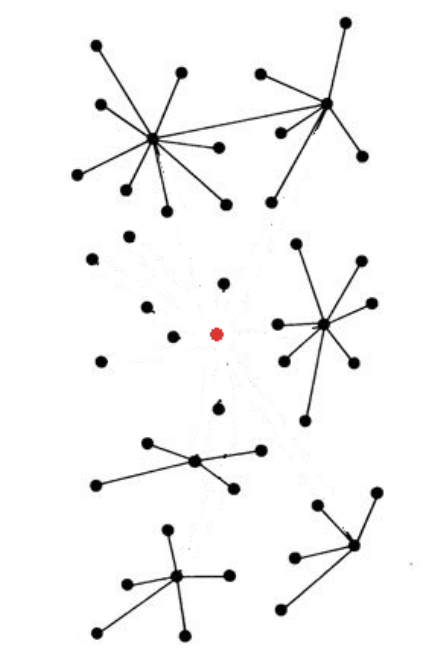You’re the captain of a scaling startup.
Every day, you’re picking up customers, grabbing headlines, raising more cash than you could have ever imagined, and hiring like mad to keep up with demand.
These are the crazy days. The “I’ll sleep after we get our next round” days.
Right now, you’re triumphing over your competitors. You’re riding the wave of culture. You’re blowing the minds of your customers.
But you’re losing another war. An invisible war. A war you didn’t even know you were fighting.
You’re losing ground to social complexity and social debt.
You understand technical debt. You know that saving time now with bad code means losing precious time eventually.
People and relationships work the same way, except that social debt compounds much faster and is nearly impossible to refactor.
To understand it, first think about your company when it was small. It felt fast. Lean. Agile. Why? Small companies simply have to negotiate fewer relationships.

At 7 total people, your company is actually a bundle of 21 relationships.
At 15, that’s 105 relationships.
At 35 people, your business is the cumulation of 595 relationships.
Every hire you make ratchets up your social complexity. And when those hires are made unconsciously and when governing structures are applied too late, social complexity becomes social debt. And when social debt accrues, bad things happen.
First, organizational culture becomes organizational cultures. That plurality gives way to the worst of human nature: tribalism. People who should be united by a common cause suddenly stop talking to each other unless forced to do so. Next, insidious conspiracies spread and take hold between teams (“They‘re planning to take control from us because they think we’re stupid.”). These cultures not only become splintered, they become defensive.
 Next, decision making slows to a crawl and learning stops altogether. Information is much harder to get now, not only because it has to flow across more nodes in the network, but because many of those nodes are isolated, sometimes connected only by a single edge. Moreover, that information now becomes colored by politics and egos. When things go wrong, you’ll find it nearly impossible to discern why because each local group has its own version of reality.
Next, decision making slows to a crawl and learning stops altogether. Information is much harder to get now, not only because it has to flow across more nodes in the network, but because many of those nodes are isolated, sometimes connected only by a single edge. Moreover, that information now becomes colored by politics and egos. When things go wrong, you’ll find it nearly impossible to discern why because each local group has its own version of reality.
After that, unethical behavior slowly becomes a new norm. With teams pitted against each other, isolated from each other, and held to increasing expectations, rule breaking and general bad behavior tend to abound.
Then, you’ll try to intervene …
First, you might try creating clarity amongst the chaos by cementing the roles of your leadership team. But after months or years of playing tower defense against other teams, this only sparks more animosity, not less. Without a greater interest than self interest, defining responsibilities becomes a zero-sum land grab and your people will play it well.
Next, you’ll try writing a set of company values. Values like “Accountability.” This will surely put you leaps and bounds beyond companies with values like, “Unaccountability.” This’ll largely be a copywriting exercise where words go on a wall and meaningful change goes nowhere.
Revenue will eventually plateau, because it always does for every company. But instead of a company that can rally together behind adversity, yours will lurch and pull in every direction but forward.
Then come the layoffs.
Splintered cultures don’t bounce back. They retreat, they blame, they look for other jobs, or worse, they just ride the paycheck until the inevitable end.
Here’s when the VC might bring in a new CEO or entire leadership team. You get ousted, left only with visitation rights and a meaningless board seat.
The new leaders will run the business purely by the numbers. They’ll juke every stat and burn out every last employee for that precious single digit growth. And after 18 months, they’ll be gone. Off to their next “turnaround.”
And in 36 months, your company will be gone. Beaten by an upstart, exhausted of cash, felled by its own sword. A unicorn imploded and a dream demolished.
You did everything right, everything you knew to do right, but still your dream crumbled.
You lost the invisible war.
Culture Doesn’t Come Later
Business, any business, is just the commercialization of human relationships. Yes, you’re building a product, but you’re actually foremost building a group of people that can work together to produce a product.
You can’t afford to ignore the most fundamental thing to your business: your people and their relationships.
You can’t excuse ignoring it because you’re “a product guy” or even an introvert. As a fellow founder, let me tell you that our duty is to others, especially to those that have signed up to share in our obsession. Culture (the emergent property of all those relationships) is messy and fluid, but no one has a bigger impact on it than you do. You have to own it.
Culture informs everything we do — even if that influence is unconscious. The people you choose to work with, the products you design, the compensation you negotiate, the environment you foster — everything is a product of culture. And new cultures are born from the embers we carry with us from past experience. Hence, culture is a day one activity and priority. And day two, day three, day four… You get it.
From Unicorns to Birds
So long as it’s still acceptable to compare startups to our friends in the animal kingdom, let’s consider the humble and hollow bird.

Birds flock and that flocking is a complex group behavior. Birds aren’t taught how to flock and there is no centralized command structure telling them where and how to fly together. Even more impressive, each flock is constantly inventing new patterns of flight in response to a changing environment, rather than following a predetermined course.
Birds can flock because they are paying obsessive attention to one another and are attempting to anticipate the future, using a set of simple rules: 1) stay with the group, 2) don’t collide with a fellow bird or object, 3) approach food, 4) avoid prey.
Flocks can swell in size and still maintain their anticipatory powers. Meaning, they can rack up social complexity without accruing social debt as easily. It seems impossible, but the Red-billed quelea can sustain flocks of more than a million members as they swarm across the African Savannah.
Simple, shared rules scale. Complicated, silo’d rules don’t.
We can learn from birds (just like the Wright Brothers). Our organizations can learn to flock and in doing so, keep social debt at bay while we grow.
If you’re a leader at a growing startup, you have three jobs:
- Nurture social bonds.
- Enforce simple shared rules.
- Grow to serve your customer. Not your ego. Not a bureaucracy.
So, how can you nurture bonds?
- You can make onboarding feel like being adopted
- You can give your existing employees a reason to invest in new hires
- You can create rituals that recognize that people are complicated
- You can foster belonging and confront society’s biases head on
- You can make it safe to take interpersonal risks and admit fears
- You can orchestrate pivotal cultural events that celebrate your people
- You can orchestrate small, random collisions between your people
- You can give rising talent access to flexible mentorship
- You can encourage cross-divisional demand for work
And so, so, so much more.
How can you enforce simple shared rules?
- You can codify your culture and use it as an explicit boundary for behavior.
Why is culture so important to a business? Here is a simple way to frame it. The stronger the culture, the less process a company needs. When the culture is strong, you can trust everyone to do the right thing. People can be independent and autonomous. They can be entrepreneurial. And if we have a company that is entrepreneurial in spirit, we will be able to take our next “(wo)man on the moon” leap. Ever notice how families or tribes don’t require much process? That is because there is such a strong trust and culture that it supersedes any process. In organizations (or even in a society) where culture is weak, you need an abundance of heavy, precise rules and processes.
From Brian Chesky, CEO of Airbnb.
2. You can create simple tools and develop rituals for when to use them:
Bezos refined the formula even further. Every time a new feature or product was proposed, he decreed that the narrative should take the shape of a mock press release. The goal was to get employees to distill a pitch into its purest essence, to start from something the customer might see — the public announcement — and work backward.
3. You can study your teams obsessively and build a body of their best ways of working.
Google set out to determine what makes a manager great at Google. But first, a research team tried to prove the opposite: that managers actually don’t matter, that the quality of a manager didn’t impact a team’s performance. This hypothesis was based on an early belief held by some of Google’s leaders and engineers that managers are, at best, a necessary evil, and at worst, a layer of bureaucracy. [..] This data quickly revealed that managers did matter: teams with great managers were happier and more productive.
And when you accomplish strengthening your social bonds and enforcing simple rules, growth comes far more naturally. Your people will talk across aisles, anticipate together, learn with more objective eyes, and march work forward with confident synchronized steps.
How can you grow toward your customer, not your ego or a bureaucracy?
- You can give them a literal seat at the table.
- You can recreate their experience for your employees.
- You can hold your employees to actually interacting with your customers.
And so much more.
The truth is that scaling is almost always impossible. And that’s precisely why we try. But if we fail, let’s not fail because of social debt. Instead, let’s dare an incumbent to move at our speed, let’s challenge our fellow upstarts to love our customer more.
Let’s build the better product by building the better culture.













